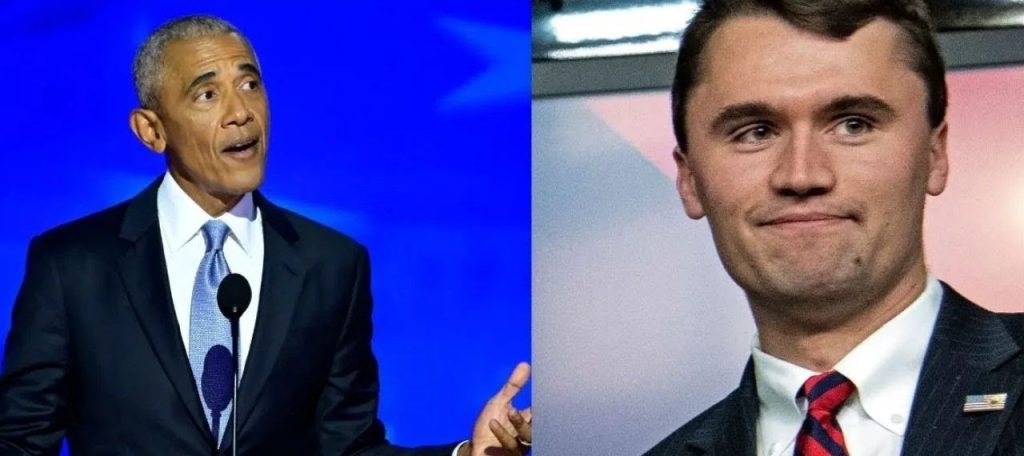
PENNSYLVANIA — Former President Barack Obama publicly addressed the tragic assassination of conservative activist Charlie Kirk this week, expressing condolences to Kirk’s family while also raising concerns about the nation’s increasingly volatile political climate — and indirectly criticizing former President Donald Trump.
Kirk, 30, was shot and killed on September 10 while speaking at Utah Valley University during a campus event hosted by Turning Point USA, the organization he co-founded. The accused shooter, 22-year-old Tyler Robinson, has been charged with multiple crimes, including aggravated murder, obstruction of justice, and witness tampering. The high-profile killing has ignited nationwide debate about political violence, polarization, and public safety.
Obama Addresses the Nation
Speaking at an event in Pennsylvania on September 16, Obama offered measured but heartfelt remarks on the tragedy.
“Look, I didn’t know Charlie Kirk personally,” Obama said. “I was generally aware of some of his ideas. I disagreed with many of them. But that doesn’t change the fact that what happened was a tragedy, and I mourn for him and his family.”
He continued: “He was a young man with a wife and two small children, with many supporters and people who cared about him. We have to offer grace to those who are grieving, regardless of political differences.”
An Indirect Critique of Trump
While extending sympathy, Obama also made comments that were widely interpreted as a pointed critique of the tone set by Trump-era politics. Without mentioning Trump by name, Obama drew a contrast between how his administration handled politically charged violence and what he described as more divisive responses today.
Referring to the 2015 Charleston church massacre, Obama said:
“When I was president, after the attack at Emanuel AME Church — an act of racial and political hatred — I didn’t turn it into a campaign against my political opponents. I focused on unity, not vengeance.”
This appeared to be a subtle rebuke of Trump, who has suggested that Robinson’s actions were politically motivated and blamed Democrats and liberal rhetoric for inciting hostility toward conservatives.
Obama added:
“When I hear political leaders, including our current president and his allies, refer to their opponents as ‘vermin’ or ‘enemies who need to be targeted,’ that’s not just dangerous — it’s deeply un-American.”
Warning Against Extremism on All Sides
Obama also emphasized that political extremism is not confined to one party.
“Whether we are Democrats, Republicans, or independents, we must confront the fact that extremism exists on both sides,” he said. “But the responsibility lies with all of us to reject it and uphold the values that make democracy possible.”
Still, the underlying contrast was clear. “Those kinds of extreme views,” Obama concluded, “were never welcomed in my White House.”
Trump Responds
The Trump campaign quickly responded to Obama’s remarks in a statement to the BBC, accusing the former president of hypocrisy and further division.
“Obama used his presidency to pit Americans against one another,” the statement read. “He helped create the very climate of hostility that Democrats now weaponize. His legacy is one of division, not unity.”
The exchange is the latest in the long-standing political feud between Obama and Trump — one that continues to define the ideological battle lines in American politics.
The National Fallout
Charlie Kirk’s death has only deepened the political divide. As a prominent voice on the right, Kirk was known for combative campus debates, unwavering support of Trump, and his influence among young conservatives. His assassination has been described by some Republicans — including Trump — as a “political execution.”
Democrats, meanwhile, have urged caution, warning against turning the tragedy into a partisan flashpoint. Some have pointed to the incident as a symptom of broader issues: gun violence, online radicalization, and the dangers of inflammatory rhetoric from public figures across the spectrum.
Robinson’s Motive and the Legal Case
Investigators allege that Tyler Robinson had long harbored animosity toward Kirk, viewing him as a divisive figure. Prosecutors revealed that Robinson left a handwritten note for his roommate, stating:
“I had the opportunity to take out Charlie Kirk, and I’m going to take it.”
Robinson has since been charged with seven criminal counts, including capital murder. Prosecutors in Utah have confirmed they will seek the death penalty.
His next court appearance is scheduled for later this month, during which additional forensic evidence will be presented.
A Nation Still Divided
Obama’s comments reflect a careful balancing act: mourning a political opponent’s death while calling attention to what he sees as the dangerous rhetoric dominating today’s political discourse.
Observers say the former president’s decision to reference Charleston — where he famously led a grieving congregation in singing “Amazing Grace” — was a subtle but powerful reminder of leadership through unity, not escalation.
As the legal and political fallout from Charlie Kirk’s killing continues, it’s clear that the tragedy has become more than just a case of individual violence — it’s a mirror reflecting the fragile state of American political life.
Leave a Reply